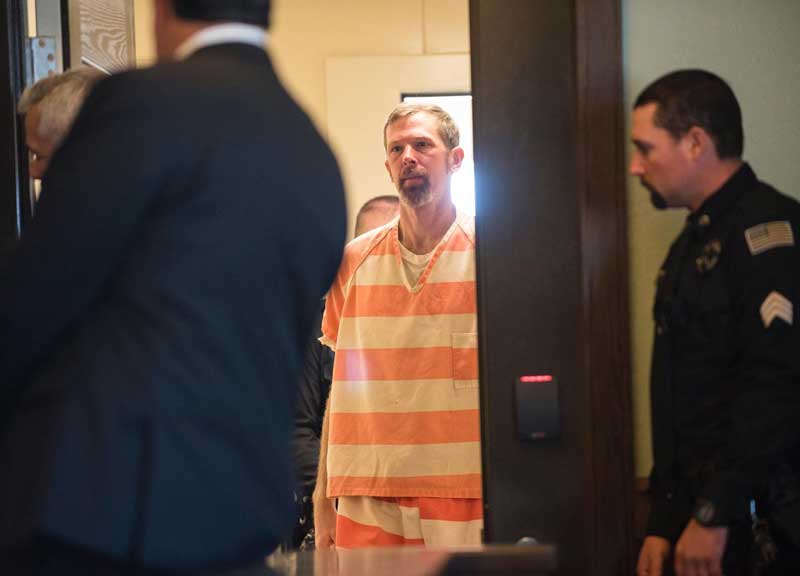Murder suspect’s attorneys move to suppress confession
Published at
DRIGGS — A Jackson man’s confession to murdering a Driggs resident and her unborn child may be removed from the evidence in his upcoming trial.
The admission, made during a police interview, may be thrown out on the grounds that it took place after he had requested an attorney and was therefore in violation of his Miranda Rights.
Erik Ohlson, 39, is facing the death penalty for shooting Driggs resident Jennifer Nalley in her cabin early on July 5 last year.
Ohlson was originally taken into custody for DUI by a Teton County Sheriff’s deputy who found him next to his pickup, which he had crashed into a power pole near the intersection of Highway 33 and 2500 North in Driggs.
Ohlson was later questioned by detectives from the Idaho State Police (ISP) when Nalley’s body was found that morning.
In the hearing, presided over by Idaho District Judge Bruce Pickett, Ohlson’s attorneys, James Archibald and John Thomas, cross-examined Teton County Patrol Deputy Andrew Sewell over his conduct during Ohlson’s DUI arrest.
The court reviewed the footage from Sewell’s body camera, which shows Ohlson being told his Miranda Rights—namely the rights to remain silent and consult an attorney before answering any questions from police authorities.
“Ohlson invoked his rights to counsel after being notified of his rights,” Ohlson’s attorneys claim in their written memorandum to suppress the evidence. “On July 5, 2016, Erik is read his Miranda Rights and refuses to talk about what happened.”
From this point on, the police had no further right to interrogate Ohlson without an attorney, Archibald and Thomas argued, but the ISP detectives did so anyway.
“The Detectives knew or should have known that Erik Ohlson had informed Deputy Sewell that he was not going to answer questions about events that transpired earlier that morning without an attorney,” their memorandum states.
In their written response, Teton County Prosecutor Billie Siddoway argued that Ohlson’s request for counsel was specific to the DUI charges he faced.
“To the extent that Ohlson invoked his right to counsel for the DUI charge, that interrogation did not preclude interrogation on a separate offense,” she wrote, adding that Ohlson had not unequivocally refused to talk with the officers in question.
ISP Detectives Matt Wall and Craig Moulton were called during the hearing as witnesses to recall how they conducted their interrogation of Ohlson.
Both officers claimed during their cross examinations that they had only proceeded with their questions about Nalley after they had received Ohlson’s assent to do so.
Siddoway underlined this point in her argument, citing the transcript of the interrogation as evidence.
“Ohlson’s statements were both ambiguous and equivocal,” she wrote. “Only after clarifying the statement and obtaining a knowing and voluntary waiver, did officers proceed to question Ohlson and ultimately obtain his confession.”
Thomas disputed this point in his closing argument to suppress the interrogation evidence by saying the officers were obliged to leave Ohlson alone after his request for an attorney.
“Once he invokes his right to a attorney, [police] can’t talk to him at all,” he said. “[Police] have to get up and leave… The prosecution is trying to make chicken salad out of chicken soup.”
Prosecutor Siddoway will provide her closing argument to the motion in writing within the next week. Further hearings on the matter have yet to be scheduled, including a motion to change the venue to out of county.
For now, Ohlson’s trial is scheduled to be held in Teton County District Court from July 31 to Aug. 18, 2017.
RELATED CONTENT:
Judge enters not guilty plea for man accused of murdering pregnant woman
Teton County, Idaho, to seek death penalty in double murder
Teacher remembered as ‘wonderful’ after being shot to death
UPDATE: Wyoming man charged with murder after shooting Driggs woman and unborn child
The article was originally published in the Teton Valley News. It is used here with permission.


